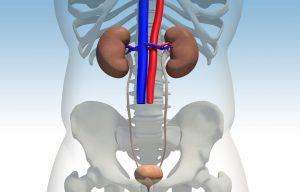Chronic Kidney Disease (CKD)
Chronic Kidney Disease (CKD) is the gradual loss of kidney function over time.
Over 26 million Americans are affected by chronic kidney disease. Damage to the kidneys can get worse over time, but with early detection and proper care, its progression can be slowed or prevented.
What are the symptoms of Chronic Kidney Disease?
CKD usually has no symptoms in the early stages. The only way to be sure how well your kidneys are working is to get tested.
Classic symptoms of CKD include:
- Changes in urine – more or less often, unusual color, or foamy appearance
- Swelling of feet and ankles, and puffy eyes
- Dry, flaky, or itchy skin
- Back, flank, leg pain
- Systemic symptoms – nausea, vomiting, tiredness, difficulty breathing, and poor appetite
How is Chronic Kidney Disease diagnosed?
- CKD can be diagnosed by one or more simple test(s). Ask your doctor about these tests, as they may be abnormal:
- Blood pressure measurement
- Serum creatinine
- Urine test for protein and blood
- eGFR (estimated Glomerular Filtration Rate)
Causes and risk factors for CKD:
- Diabetes and hypertension are the most common causes
- Diseases that affect the kidneys, including autoimmune diseases such as lupus
- Inherited and congenital kidney diseases, or family history of kidney disease
- Ingestions or exposures – smoking, NSAIDs, illicit drugs, herbal/slimming remedies
- Urinary tract infection and/or obstruction, and other systemic infections both bacterial and viral
- Ethnicity – African Americans, Hispanics, Native Americans
Treatment and prevention of CKD
If you treat kidney disease early, you may be able to slow its progression. If kidney disease is not treated, it can cause your kidneys to fail, and you may need dialysis or a kidney transplant.
The best way to slow or prevent kidney disease is through a combination of medication and lifestyle changes, such as:
- Maintaining healthy blood pressure and blood sugar
- Being active
- Eating healthy and maintaining a healthy weight
- Quitting smoking
- Managing stress

Patient Resource Sheet
Quick note: This post is to be used for informational purposes only and does not constitute medical or health advice. Each person should consult their own doctor with respect to matters referenced. Arkana Laboratories assumes no liability for actions taken in reliance upon the information contained herein.



